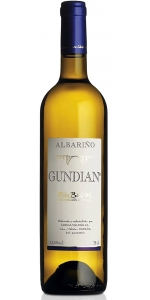Wine from Adega Valdes

Adega Valdés is a reflection of the vocation and work of the Valdés family who for more than 30 years has been the owner of twenty hectares of vineyards on the banks of the Ulla River. In 2001, with the extension of the Rías Baixas Designation of Origin to that area, the current winery was founded, combining the family tradition with the most avant-garde winemaking techniques.
All the wines of Adega Valdés are estate grown. The quintessential grape cultivated at the property is the "albariño", the core character of its first brand, Gundian. The winery also owns a significant area dedicated to the “treixadura” variety, which allows to produce multi-varietal wines of different aromatic intensity.
The Valdés family vineyards are located in the lands of Vedra, at the foot of the historic Gundian Bridge, between Monte de las Roxas and Castro San Miguel. This privileged area belongs to the Ulla subzone, within the Rías Baixas Designation of Origin.
Gundián is a local surname & the name of several Galician villages (3 in the area) as well as a famous bridge in Galicia - thus the bridge graphic on the label. The Gundián Bridge, also known as the Gundián Viaduct, is a bridge that spans the Ulla river pass, on the old railway line between Orense and Santiago de Compostela.
Clean and bright wine, straw yellow color with greenish flashes. On the nose, it has fruity and floral aromas of high intensity, especially apple and stone fruits (apricot). In the mouth, the freshness and youth of the Albariño stand out with a well balanced acidity which makes it savory, sweet and glyceric.
- back
Selected Options
Wineries
Categories
Pricing
Countries
Regions
Grape Types
Wineries
Organic/Free Shipping
Tua Rita Giusto di Notri is made from 60% Cabernet Sauvignon, 30% Merlot and 10% Cabernet Franc.
The word "Giusto" refers to the name of the Patron Saint of Suvereto (the hilltop Tuscan town where Tua Rita is located) and "Notri" is the name of the winery's exact location.
Giusto di Notri is a Bordeaux-inspired blend of 60% Cabernet Sauvignon, 30% Merlot and 10% Cabernet Franc, selectively harvested in September. After a gentle pressing, the juice and skins macerate for a lengthy period of 25-30 days to add concentration and depth to the final wine. The wine is then aged for 18-20 months in French oak barrels and refined six months in bottle before release.
Deep purple in color, Giusto di Notri offers abundant aromas of blackberry, plum and currants with underpinnings of coriander, violet and a touch of vanilla. Full-bodied, with ripe, fine tannins, and a silky texture, this is a stunning wine with great aging potential.
Ideal for barbecued ribs, steaks, grilled meats and medium-aged cheeses.
Review:
Lots of incense to the aromas with sandalwood and lavender. Currants, blackberries. and fresh herbs, too. Full-bodied and very rich, with a powerful, structured mid-palate and a long, longfinish. A wine for the future. Needs four to five years to soften. Best after 2026.
-James Suckling 97 Points
Turley Pesenti Zinfandel is made from 100 percent Zinfandel.
This certified organic estate-owned vineyard was planted in the 1920s on primarily limestone soil. Though the vines are head-trained and dry-farmed, the soil plays the most important role in distinguishing this vineyard on the west side of Paso Robles. The wines have a brightness, with chalk and floral characteristic aromas unique to the site, and to Zinfandel in general.
Review:
Dark and brambly, with brooding plum and blackberry flavors accented by licorice, clove and smoked pepper tones as this builds grip toward medium-grained tannins. Drink now through 2035. 2,387 cases made.
-Wine Spectator 93 Points





